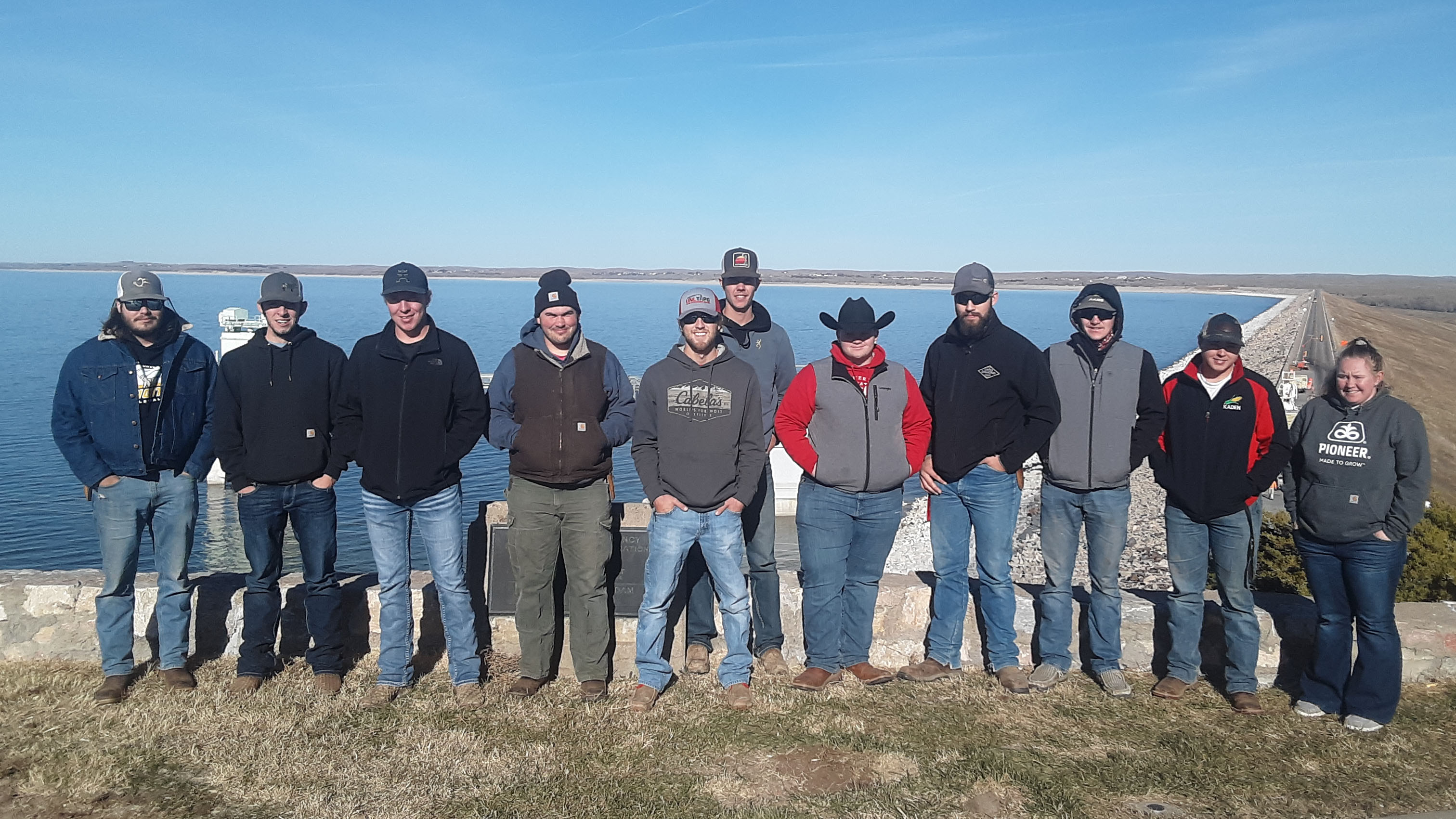Aggie field trip views irrigation system

By Mary Crawford, NCTA News
Nebraska water issues and irrigation management are some of the leading topics in Brad Ramsdale’s college classroom.
After all, many crops need consistent water supply for top yields. Nearly 8.6 million acres of Nebraska's cropland are irrigated by surface gravity flow or pressurized irrigation systems.
Ramsdale is the agronomy professor who teaches an irrigation management course, coaches the Aggie Crop Judging Team, and is also faculty sponsor for Collegiate Farm Bureau at the Nebraska College of Technical Agriculture in Curtis.
In mid-November, 11 NCTA students saw first-hand the hydropower, storage and delivery system operated by Central Public Power and Irrigation District.
“We started at Kingsley Dam between Lake McConaughy and Lake Ogallala and went down into the Kingsley Hydroplant. That was pretty neat to see that operation immediately below the dam,” said Cooper Mazza, Farm Bureau club president, and a diversified agriculture major from Potter, Nebraska.
“Then we traveled to Paxton and looked at the big siphon underneath I-80. It’s over a mile long. And, then east of North Platte to where they pull water at the diversion and saw a control center at Gothenburg which is part of Central’s water conveyance system. It makes you realize that there is a lot more to the whole system than Lake Mac.”
Allison Wilkens of Gibbon is a sophomore agronomy major who is in the irrigation management course, on the NCTA Crop Judging Team, and a member of Farm Bureau.
“I was not familiar with the canal system before this tour,” Wilkens said. “I thought out at Lake McConaughy was cool because they built the dam many years ago, and it is still intact today.”
The lake known as “Big Mac” is the primary storage reservoir for CNPPID, which delivers water to more than 109,000 acres of crops along the south side of the Platte River, between the towns of North Platte and Minden.
CNPPID also provides water to irrigation projects serving an additional 100,000 acres along the North Platte and Platte Rivers, which converge east of North Platte.
“Being able to go see the huge generator and how they produce power was interesting,” added Wilkens. “I also thought it was cool when we went down to the Gothenburg control center and see how they controlled almost everything from that location.”
The educational trip started at 7 a.m. and ended back at campus at 5 p.m.
“Dr. Ramsdale has been taking NCTA students on tours of Central’s hydro-irrigation project for several years to learn about water, power and other natural resources,” said Central’s Government and Public Relations Manager Jeff Buettner.
“We are grateful for the opportunity to help educate the students about the importance of water resources and public power to agriculture in the Platte Valley, as well as to describe the diverse benefits provided throughout the region.”
Although he lives and ranches with his family near Sutherland, agronomy major James Lee said he is familiar with the concept of the canal system but has no personal experience with canal irrigation.
“One of the take-aways that I found very interesting from this trip was how when Kingsley Dam and the canal system was built. Engineers back then had the foresight to see the potential for all the hydropower opportunities along the system,” said Lee, who is vice president of the Farm Bureau Club, as well as a leader of the Business Club and NCTA Student Senate.
The group learned that the canal system’s uses prioritize irrigation, hydropower, wildlife habitat and recreation which includes Big Mac, Lake Ogallala, many small interstate lakes, and Johnson Lake south of Lexington.
Information about NCTA’s Agronomy Industry Management program is available at https://ncta.unl.edu/agronomy-industry-managment.
Part of the University of Nebraska system, the Nebraska College of Technical Agriculture is a two-year institution with a statewide mission of preparing students for successful careers in agriculture, veterinary technology and related industries. NCTA is known for its affordable tuition, high job-placement rate for its graduates, and for the success of student teams in competitive activities including crops judging, ranch horse events, livestock judging, shotgun sports, stock dog trials, and intercollegiate rodeo. The college is consistently ranked as one of the best two-year schools in the nation.
Download a PDF of this press release